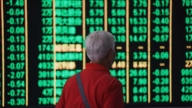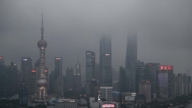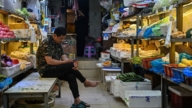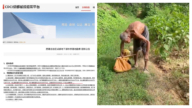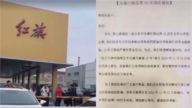【新唐人2013年09月26日訊】大陸中秋剛過,本週踏入9月季末,而下週又是「十一」長假,市場資金再現緊張。為緩解市場資金壓力,中共央行24號「放水」,展開6天期的880億元的逆回購,以逃避「錢荒」重演。另外,一二線城市房市從8月份起成交量回升,樓價飆漲不下,銀行信貸卻急踩剎車,全線收緊,究竟是甚麼原因?中國的錢荒真的結束了嗎?我們來看專家的分析。
為應對「十一」假期的到來,24號,央行將常規7天期逆回購操作改為6天期,開展了880億元的逆回購操作,這是自7月底重啟逆回購的8周以來,最大單筆逆回購操作。
有分析人士認為,央行擔心6月錢荒再度重演,希望透過短期逆回購充分保持市場流動性,體現央行「節前放水消解市場恐慌」用意。
中國人民大學行政管理學研究所所長,北大政治學博士毛壽龍表示,中國各地地方債務長期佔款多,並且以新債抵舊債的形式迴圈;而樓市貸款大,貸款資金又不能及時回籠回收。
中國人民大學行政管理學研究所所長毛壽龍:「尤其是銀行,本身的資金池運作,就是用個人的存款、尤其是活期存款,形成的資金鏈,去進行貸款這樣的目錄以外的一些活動、監管以外的一些活動,這個領域它的進的利息比較低,出的利息比較高,但它風險比較大,尤其到假期來臨,是一根導火線,很多人會拿錢去用,它可能讓這個資金情況在短期裏面就暴露出來,那個錢荒也可以這麼說」。
香港《經濟日報》引述《經濟通通訊社24號專訊》指稱,「十一」長假前上海銀行間同業拆放利率仍高,一個月期拆息超過6%,金融股領跌指數,銀行、券商全面下挫。同業拆放利率是指銀行同業之間的短期資金借貸利率。
毛壽龍分析,銀行資金緊張會導致短期利率的上升。
毛壽龍:「利率一旦上升,大家就對金融沒有信心,有些地方就會有擠兌,尤其像養老金這些領域。」
另外,據銀行業內人士透露,從中秋節前一週開始,口頭接到分行通知,暫停接受包括房屋類首套、二套貸款、消費類貸款、經營類貸款的審批。
大陸媒體報導,日前北京廣州等樓市開盤當天即被售罄,頻頻出現「日光碟」。據中原集團研究中心《新建住宅市場月報》顯示,一線城市新房市場在今年7月經歷了成交量普跌後,8月成交量強勢回歸,纍計成交量較7月增加15.4%。三四線城市成交量環比增長6.8%。
這麼火爆的樓市,為甚麼急剎房貸呢?
美國南卡羅萊納大學艾肯商學院教授謝田分析,大陸銀行停止放貸一是出於自己貸款業務風險的考慮,同時也看到國有銀行自身在鬧錢荒,害怕中共總理李克強對那些國有銀行和國有房地產企業釜底抽薪,造成未來現金流出問題。
美國南卡羅萊納大學艾肯商學院教授謝田:「對銀行來講,一些中國銀行它實際上比任何人都清楚它們面臨的風險在哪裏,它們實際上非常清楚的知道房地產泡沫的風險,但是它們有自己的利益在裏邊,有動機、有個人自己自私的理由希望這個泡沫繼續的生長、繼續的增長。」
謝田表示,國有銀行的錢荒最終一定會導致它們緊縮銀根,收緊放貸,一旦這些貸款、房地產投資收緊,房地產市場必然無法支撐,這對所有人來說都是提心吊膽的時刻。
毛壽龍指出,所謂的錢荒其實是金融危機的另外一個代名詞。
採訪編輯/易如 後製/黎安安
Alert – Cash Running Low as October Holiday Approaches.
Anchor :
After the Mid-Autumn Festival, it’s the last week of
September and China will have the October Holiday
in the following week. But cash runs low in the markets again.
To ease the cash squeeze, China Central Bank injected funds
on September 24, and launched a six-day reverse repurchase
agreement (repos) which is 88 billion RMB in total.
In addition, the housing market turnover rose from August
in the first and second tiers cities, and property prices
continue to soar very high.
The banks are suddenly putting the brakes on, all across the board.
What’s the reason behind the cash flow shortage? Is the cash shortage
ended? Let’s see the report!
Reporter:
To anticipate the upcoming October Holiday, China Central
Bank changed the routine seven-day repos into six-day on
September 24 and launched 88 billion RMB’s purchasing.
This is the biggest repos in 8 weeks since it restarted
the repos at the end of July.
Some analysts believed that China Central Bank is worried
that the cash shortage will happen again, and has acted to
maintain sufficient liquidity in the market.
This is the intention of the Central Bank’s approach:
“Inject funds to solve cash squeeze before the holiday".
Mao Shoulong is Director of the Institute of Administrative
Sciences, China People’s University and a political PhD.
of Peking University.
He said that the debts of China』s Local Governments is absorbing
the funds, and the governments apply for new debts to pay
for the old ones.
Also, the debts in the housing market are huge and the funds
cannot be circulated and recycled in time.
Mao Shoulong, Director of the Institute of Administrative
Sciences, China People’s University:
“Particularly the administration of the pool of funds: the bank
is using individual deposits, especially the demand deposits to
create a capital chain that can be used for investment in
activities which is not a loan and does not need supervision.
In this scenario, the interest on debt is low but the interest
on credit is high although the risk is very high.
In the holiday season, many individuals will withdraw their cash
which exposes the cash shortage. This is the reason for the cash
shortage happening in China."
The Hong Kong “Economic Daily" quoted “the 24th News
Flash of Economic News Agency":
Reported that the monthly interests among Shanghai Banking
industrial is very high before this October Holiday, which is over 6%.
The financial stocks are leading the falling index, the stocks of
the banks and securities are falling overall. Interbank offered rate
refers to the interbank lending rates for short-term funds.
Mao Shoulong analyzed that the cash shortage of the banks
will lead to a short-term interests rise.
Mao Shoulong:"Once the interest rate rises, people will
lose confidence in the economy. In some places, there will
be squeezes, particularly in such fields like pensions."
In addition, according to an insider of the banking industry:
the banking industry had been rumored one week before the
Mid-Autumn Festival that it has suspended new and
second-hand housing loans, consumer loans and
business type loans.
China media reported, that recently many new housing
projects were sold out in the opening day in Beijing,
Guangzhou and other cities.
“One Day Sold Project" is happened frequently. According to
the “New Housing Market Monthly Report"by Central Plains
Research Center Group:
The first-tier cities, experienced an overall decrease in July.
Trading increased dramatically in August. The cumulative trading
volume increased by 15.4% compared with July.
In the third and fourth tier cities, the cumulative trading volume
increased by 6.8%.
The housing market is so hot,
why suspend the housing loans so suddenly?
Xie Tian, Professor at University of South Carolina-Aiken,
analyzed the reasons why Chinese banks suspended
the loans:
It’s based on the loan risks and cash shortage in state-owned
banks. They are afraid that Li Keqiang, the Chinese Premier will
suspend support from the state-owned banks and state-
owned real estate companies.
This will lead to problems in their future cash flow.
Xie Tian, Professor at University of South Carolina-Aiken:
“For banks, in fact some Chinese banks know exactly
where their risks lie, more than others.
They are very clear about the risks of the real estate bubble.
But they have their insider perks, and hope that the
bubble keeps on growing for their own interests and their
selfish reasons."
Xie Tian said that the cash shortage of the state-owned banks
will finally lead to them tightening cash flow, and tighten up
the loan control.
Once these loans and investments are restricted, the housing
boom will definitely lose support.
And that is the scariest time for everybody.
Mao Shoulong also pointed out that the so-called
cash shortage is another name for financial crisis.



